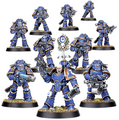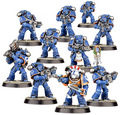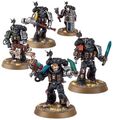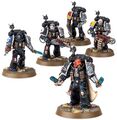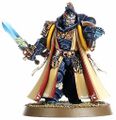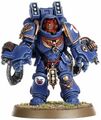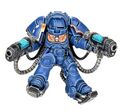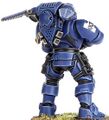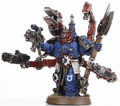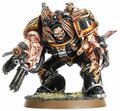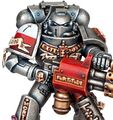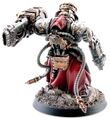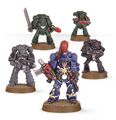Power Armour: Difference between revisions
(→T-49 Powered Armor: "GREUUURUGH VIBEO GAME NOT USE REALISTIC SCIENCE, IS SOSHUL JUSTICE FAULT!!!" (SMASHES COMPUTER WITH CLUB)) |
|||
| Line 165: | Line 165: | ||
{{clear}} | {{clear}} | ||
====Chaos Power Armour==== | ====Chaos Power Armour==== | ||
[[File:ChaosAstartesArmor.png|200px|right|thumb|I'm horny and you corpse-worshippers' got the butts I CRAAAAVE]] | [[File:ChaosAstartesArmor.png|200px|right|thumb|[[rape|I'm horny and you corpse-worshippers' got the butts I CRAAAAVE]]]] | ||
While many Traitor Marines are equipped with Marks IV or earlier (at least in the lore; if you go buy the models, almost all of them seem to have Mark VII armour with Mark VI legs), Chaos power armor is often a mix-and-match setup. About the only unified feature of Chaos power armour is a distinct power pack with stabilizers on long curved fins, that still runs on solar converter core instead of fusion reactor of modern loyalist power packs. Because Chaos Marines often have to go long periods with no access to proper industrial facilities, proper maintenance and replacement parts became an issue. Because of that, many subsystems in each suit of armor don't work and replacement parts come in the form of whatever they can dig up from plunder and take off of corpses after [[Orks|raiding and looting]]. Furthermore, Chaos Marines like to customize their armor with devotional iconography and personal trophies, making sure that virtually every suit of armor is personalized and none are exactly alike. Where things get even weirder is when the armor gets too steeped in Chaos and begins to twist, mutate, and turn partially organic, or had a daemon replace its machine spirit. It's quite likely that the parts of armor that don't work get replaced with warp magic, daemonic influence, or Dark Mechanicus tech-heresy. | While many Traitor Marines are equipped with Marks IV or earlier (at least in the lore; if you go buy the models, almost all of them seem to have Mark VII armour with Mark VI legs), Chaos power armor is often a mix-and-match setup. About the only unified feature of Chaos power armour is a distinct power pack with stabilizers on long curved fins, that still runs on solar converter core instead of fusion reactor of modern loyalist power packs. Because Chaos Marines often have to go long periods with no access to proper industrial facilities, proper maintenance and replacement parts became an issue. Because of that, many subsystems in each suit of armor don't work and replacement parts come in the form of whatever they can dig up from plunder and take off of corpses after [[Orks|raiding and looting]]. Furthermore, Chaos Marines like to customize their armor with devotional iconography and personal trophies, making sure that virtually every suit of armor is personalized and none are exactly alike. Where things get even weirder is when the armor gets too steeped in Chaos and begins to twist, mutate, and turn partially organic, or had a daemon replace its machine spirit. It's quite likely that the parts of armor that don't work get replaced with warp magic, daemonic influence, or Dark Mechanicus tech-heresy. | ||
Revision as of 13:47, 26 April 2019

"Feels like you can take on the world in there, doesn't it?"
- – Danse, Fallout 4
Power Armour is a science fiction concept of armor which increases the strength, speed, and reflexes of those who wear it. It is featured heavily in science fiction/fantasy settings such as Warhammer 40,000.
Starship Troopers
Like so many military science-fiction concepts, the modern idea of powered armor dates back to the Mobile Infantry of Heinlein's Starship Troopers. The "Marauder" suit is bulky, with integrated thrusters and heavy weapons (including nuclear weapons and heavy explosives, carried as easily as a human soldier carries grenades). Their primary purpose is not to destroy indiscriminately (though they certainly can), but to "make war as personal as a punch on the nose" -- to drop in and destroy with precision, in order to break the enemy in exactly the right way. In other words, it's much like Crisis battlesuits with less weeaboo and more humanity fuck yeah inside.
Heinlein never discusses pauldrons, but the Space Marines certainly take after the Mobile Infantry's other aspects.The dudes from the book not the movie. That was a parody anyway.
Warhammer 40,000
Because 40k has a huge hard on for Space Marines, and because no super soldier worth his genetic enhancements will go into battle without super armaments, 40k has developed nearly as large a hard on for power armor.
Space Marine Power Armour
The most iconic users of power armour in 40k are the Space Marines and the Chaos Space Marines. Made of ceramite layers upon plates of plasteel and adamantium/adamantite which will deflect all but the most powerful of weapons, Power Armour possess many life support systems designed to keep the Space Marine inside alive, even in the worst and most extreme of battlefield conditions. Has physical properties that has lead some material scientists (who clearly also do Warhammer) to speculate whether Space Marine armour is in fact an extraordinarily tough ceramic compound (ignoring all this easily trademarkeable sci-fi bullshit about plasteel and adamantium/tite), which would make sense given that the Emperor actually invented very little new stuff when making the Marines' battle gear, instead just scaling up and making it bigger/louder/harder/better/faster/stronger etc.
The Black Carapace, one of the Gene-Seed organs, is specially designed to allow a space marine to interface his nervous system with his armor and is the last organ implanted in Codex Chapters. Amongst its features, power armour possess auto-senses to supplement the Marine's already considerable senses, auspex arrays to create minimaps and transmit data between squad members and commanders, painkiller delivery systems in the event of severe bodily damage, and waste recyclers to keep the Marine going for up to fifty days without fresh food or water. Or, for that matter, taking a shit. The connection between the two being one of the rather less dignified aspects of Astartesdom. The power source is a backpack mounted generator which needs initializing, but after that can take solar energy to keep itself going. According to GW, the backpacks themselves were inspired by the bedrolls carried by soldiers in the Napoleonic era. The "roll" on the backpack contains oxygen for use whenever the environment demands (like space combat) and the balls on the sides are either jet engines for maneuvering in space or heat vents. Some early art showed they are more likely jet engines, and can lift a Space Marine for extra battlefield maneuverability, though presumably nowhere near as good as a Jump Pack.
There are eight ten (technically nine because one has never been shown) types or Marks of Power Armour used by the Astartes. Regardless of their type, they all have massive Pauldrons, under which the Marine's ammunition is stored. Pictures can be found in the gallery at the bottom of the page.
Mark I: Thunder Armour

The first type of Power Armour was designed for the Thunder Warriors and worn by many of the techno-barbarians of Terra. They provided basic protection against weapons and enhancements to upper-body strength, but that is all - the suit was incapable of supporting its own weight and basic variant did not provide any significant protection to the legs. Which seems like a bizarre and terrible idea given that as any person who moves furniture often can tell you; you should do most of your lifting with your legs, and as most soldiers can tell you, having to carry a lot of extra gear with the weight distributed onto your shoulders sucks and is exhausting, and being fatigued significantly hurts combat effectiveness. But perhaps this was intentional as the Emperor intended to replace the Thunder Warriors anyway. Since they were only used on Terra, there was no need to protect them against the void. Though the lack of life support systems and much lesser degree of protection make them essentially useless in the 41st millennium (this doesn't seem to stop people from pestering Forge World to make models for it though, even though they've said that they won't for exactly this reason), several Chapters retain sets of Thunder Armour for ceremonial purposes. If you were to field one now, it would probably count as carapace armor (4+ save) with a slight bonus to strength but a penalty to initiative.
In Deathwatch, you can actually get your hands on some. Be forewarned: it's noisy, doesn't offer as much protection, doesn't work with a Marine's Black Carapace, and actually might not be a whole suit of armor depending on its state of repair. Overall, it's kind of shitty, but it's a surviving artifact linked to the days of the living Emperor and early Imperium and that impresses other Marines and those Ecclesiarchy schlubs. Take it for formal occasions.
Mark II: Crusade Armour
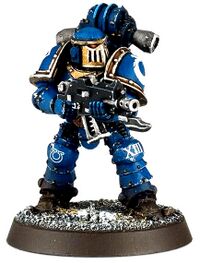
Designed by the Adeptus Mechanicus with the Great Crusade in mind, the Mark II armour was fully enclosed and contained all the life support and auxiliary systems now common among Astartes power armor, like a waste recycling unit and automated medical equipment. Much of these newer additions were made possible by a more efficient cooling system, which allowed a considerable reduction in the size of the powerpack. The helmet also came with a bunch of enhanced sensory equipment. Overall protection and flexibility was much improved, especially since the legs were now enclosed in armoured hoops and came with their own servomotors. Unlike the Mark I suit, the design is still sufficiently sound to remain in active, albeit extremely limited, use well into the 41st millennium.
Early depictions of this armour often featured a fixed helmet, similar to old-school diving suits. While Forge World completely retconned this away for the sake of compatibility with other Marine kits, there had been depictions of Mark II suits with movable helmets since the Rogue Trader days, so it's not like GW were ever consistent about it anyway.
Mark III: Iron Armour
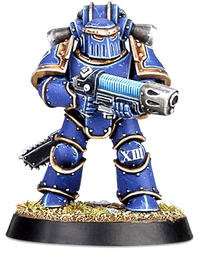
Mark III armour was first conceived for the Squat campaigns boarding actions of the Great Crusade. It was pretty much a modified Mark II designed to provide better frontal protection for close quarters combat, essentially fulfilling the same role that Terminator armour would later fulfill. By the time of the Horus Heresy, the Mark III was slowly being phased out and replaced by Terminator armour, but it's still fairly common among the Traitor Legions. In fact, several of the more traditional Legions were reluctant to phase out Mark III because it was the most brutally iconic mark of power armour in their day, so there was talk of keeping it for honour guards or spear tip operations. Even into M41, the helmet or faceplate is still popular. It appears as a DLC armor in The Last Stand
for the Space Marine Captain, where it increases the force of his melee strikes.
-
-
Ultramarines
Mark IV: Imperial Maximus Suit
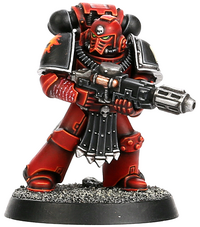
Now having access to more Standard Template Constructs, the Mechanicum was able to further refine power armour internal systems. In addition to having more advanced visual sensors, the helmet was now capable of easier movement. The suit was also made a whole lot lighter than before while only marginally reducing Mark II's protective capabilities. Bears mentioning it had much, much more superior manufacturability compared to MkII and was easier to repair due to its nature of having no interlocking armor plates and whatnot. Although the chest power cables were once again relocated to the outside of the plating, they were given an armoured sheath to protect them from damage. Horus Lupercal manipulated the Mechanicum's supply lines to ensure that the Legions that were planning to side with him in the Heresy would be fully equipped with Maximus Armour in time for the Heresy; as a result Mark IV was usually reserved for Chapter Masters and senior Captains of the Loyalist Legions. As the Legions were either fully or partially re-equipped with these suits by the time the Horus Heresy began, Mark IV is one of the most prevalent types of armour among the Chaos Space Marines.
Some Chapters/Legions also made their own sub-patterns of Maximus power armor, such as the Ultramarines' Praetor pattern and the Thousand Sons' Achean pattern.
-
-
Tactical Squad
Mark V: Heresy Armour

In between production of the Mark IV and what would be the Mark VI, both Loyalist and Traitor Legions found that they were running out of replacement parts for damaged systems. This would result in several Legions taking parts from older Marks and inadvertently making a brand new Mark of Power Armour. Although appearances varied widely as a result of its ad hoc nature, some form of standardization was achieved. One of the most notable was the introduction of molecular bonding studs on the left pauldron and both greaves (the famous "rivets"), which made them look totally Metal - these were actually originally designed to field-patch busted vehicle armour before they could be repaired properly. Probably one of the most common suits of armour in service among the Traitor Legions, since this was what most of them were wearing when they retreated to the Eye of Terror.
For a while, the Horus Heresy novels and black books outright retconned Mark V armour into a catch-all term for any improvised or prototype suits that existed outside of the main Mark series, yet weren't advanced enough to be considered artificer armour (likely so Forge World wouldn't get nagged to make variants of all their Mark III and IV squads in Mark V as well). However, they ended up backpedaling on this a bit in Retribution. The classic "studs and cables" version shown here is now apparently considered the "production" model of Mark V armour (presumably an Adeptus Mechanicus-sanctioned version that went into mass production), while the more variable, improvised suits it was based on are "non-production" models. Presumably, Forge World realised that the retcon didn't make much sense, since all known art and models of the armour up to that point were no less visually consistent than any of the other Marks (and arguably more consistent than a couple of them).
Mark VI: Corvus Armour
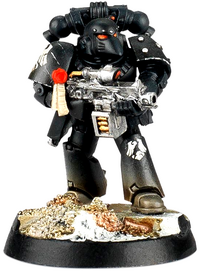
The much beloved Beakie armour. Designed during the latter years of Great Crusade, this one was initially field-tested by Salamanders and Iron Warriors to become a proper Mk V. While the former's reaction is unknown, Perturabo despised the idea of reducing the protection of his cannon fodder sons. He arranged the next test to be conducted by the Raven Guard, and so Corax, whom our autistic wierdo didn't like, received a lot of Mk VIs and was sent on the galactic fringe to fight Eldar. To Iron Lord's surprise, the test was such a smashing success that the suit received the XIXth Primach's name, and beakie armour became a common sight in his legion even before it was actually accepted for service in wider Imperium. It anticipated some of the lately developed Mark VII features, producing a suit of armour that is in many ways equal to its descendants, if being a little bit specialized. Although it offered the worst protection compared to all other proper marks, Mark VI armour was the first to feature a redundant power system and parts that are largely interchangeable with those of other marks, particularly with Mark VII. Somehow, it also manages to be lighter and fit together more smoothly than the current Mark VII Aquila, allowing for quieter movement, while the helmet includes further improved sensor systems in its, um, "beak". Due to the design's inherent stealthiness and legacy, it still remains the preferred armour among the sons of Corax, who tend to be saddled with older equipment anyhow. For reasons nobody can seem to explain, it was also sporadically used by the Alpha Legion around the time of the Horus Heresy even though it was never actually issued to them. Then again it's the Alpha Legion so who knows.
Mark VII: Aquila/Imperator Armour

The most common Mark of Power Armour among loyalist Space Marines, Mark VII armor was still being designed when the Traitor Legions reached the Sol System and seized Mars. When this fact became all too foreseeable, Rogal Dorn ordered the design teams transferred to Terra to prevent the Traitors from seizing it. Mark VII featured completely covered chest and arm cabling, a distinct helmet that provided more protection, a high level of compatibility with previous Marks, and also bore the Imperial Aquila on the chest, which was first used there to provide quick identification of the Loyalist Marines during the chaos of the Siege of Terra.
Mark VIII: Errant Armour

Jes Goodwin originally designed it with awesome Power Fist-style hands, a modified helmet, a streamlined power pack, and a more flexible leg-and-ankle joint. Games Workshop only bothered with using the altered breastplate, so the overall design looks like a regular Mark VII with a collar. Said collar is described as being brought into use due to an alarming pattern being noticed; namely, that bullets would deflect off the top of the breastplate and up into the bottom of the marine's helmet, killing him, or would pass in-between the bottom of the helmet and the top of the chest plate, into the marine's throat, killing him (similar to a shot trap found on the gun mantlet of Nazi Germany's Panzer V Panther D & A tanks in WW2). Breaking the trend of reverse-compatibility between newer and older marks, this Mark can only accommodate the helmet designed for it, which kind of becomes a moot point when reserving it for officers, since everyone higher up than a battle brother will never wear his helmet. The specialist design, or the Adeptus Mechanicus's head-up-own-arse tendencies around distributing new technology, are thought to be the probable reasons why it has yet to be widely adopted among Space Marine chapters. Because of its rarity, the armour is generally restricted for use by senior officers only, and even then they'll usually only be able to wear the breastplate. Munitorium series from GW, however, shows that it's fully compatible with Mk7, so Veterans will sometimes receive a part of Mk8 to replace analogue from their Mk7 for some heroic deed, meaning if some Veteran is equipped with full Errant pattern, he is a serious badass and likely expects promotion. The Minotaurs and Deathwatch chapters appear to be the exceptions here, as almost all of their battle brothers have access to full suits, the former because they suck the High Lords' dicks and the latter because the Deathwatch is a special operations group made up of veterans of all chapters.
It should be noted that, while artificer armor, at least in the art, looks like a pimped out Mk.VIII, regular Mk.VIII doesn't actually improve armor save. But Fantasy Flight gave it some love with an extra armour point all around, and the ability to deflect some headshots to the chest, greatly improving its protection and explained why so many officer using it tend to not wear a helmet (not to mention that the collar helps protect the neck from shrapnel or shots hitting it).
-
-
The Errant Armour comes as a standard...
-
in the Deathwatch, apparently...
Mark IX Armour
Who the fuck knows, really. This mark was skipped over when Mk10 was introduced, and no details were made available. It could either be an Mk5 treatment, with any Mk7 or 8 suits made with improvised parts or even contemporary Artificer Armour counted as the Mk9. Another possibility is that the Mk9 might be part of Guilliman's new job of actually getting shit done and gets a new mark rolled out for the Classic Marines. Nothing's really known at this point, so actual information should come out in a some weeks and there's still no word, over a year after Primaris were announced. Why GW don't make a new set of models and saying that this Mark is used to bring Veteran Marines physical capabilities to Primaris level is a mystery for the ages. Then again, it could just be that Mk 10 sounds way cooler than Mk 9 (iPhone X, anyone?), although Geedubs did allude to its existence when Primaris armour was revealed to be numbered as 10.
If it helps, it has been suggested in forums and such, that Mark 9 power armour was that 'variant' which was used by pre-primaris Librarians. Still, it is annoying that nothing official is there to be found. This could of course be nothing more than wishful thinking or plain old nonsense, as Librarians have been shown in various armour Marks, and some sources have shown their psychic hoods as a detachable add-ons rather than built-in.
Mark X: Tacticus Armour
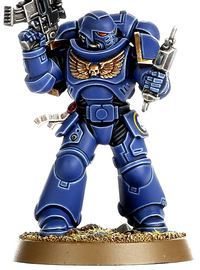
A new form of Power Armor introduced in 8th Edition, worn primarily by the Primaris. Combines aspects of Mk8 armor (the collar) with aspects of earlier variants (the helmet (mk4) being the obvious bit) and all the latest technology of the Imperium in the 42nd Millennium. (Still doesn't affect armor save, but it might provide an additional wound, as we have not yet seen Primaris Marines in any other armor or non-Primaris Marines in this suit, so we don't know if their extra wound is innate or from the armor.) So far it's only been shown on the Primaris Space Marines, it is unknown if the scruffy old obsolete Space Marines will get it. The vambraces are noted to have built-in cogitator systems, which can be used for a variety of purposes depending on the user's role. Like all MK10 armour the tacticus class is highly variable, for example the librarian has a Gravis style plated belly. Other changes can be seen across the range, such as the form-fitting greaves on the Chaplain, and the occasional addition of tassets to the hips (especially common on Hellblasters).
-
Primaris Apothecary -
Primaris Chaplain -
Primaris Librarian
Mark X: Gravis Armour

A Mark X variant; crunch-wise, it's Power Armor with +1 Toughness. Yay. (Rumors that 8th Edition is being designed to make future vidya projects easier to code remain unfounded.)
Gravis armour is worn by the Captain included in the Warhammer 8th Edition Boxed Set. The example captain had both a master crafted power sword (that does two wounds nowadays) AND a brand new Boltstorm Gauntlet which combines the functionality of a power fist with a bolt pistol capable of firing at triple rate -- Marneus Calgar approves. Said armour design appears to take some leanings from ... Iron Man (a noted early proponent for the founding of the Mechanicus, as such a most blessed servant of the Omnissiah), or perhaps the T'a *BLAM* HERESY!, terminators, with what appears to be augments on the legs, an enhanced ribcage, and an enclosed armoured hoodie for good measure.
Gravis Armour (like all MK10) is highly variable; for example the Inceptors have a tacticus style bodyplate.
Gravis Armour is also worn by the Inceptor Squads, granting them the toughness boost as well. Their version also comes with built-in jump packs, replacing the normal backpack-worn type, and shutter style face visors. Another variant is worn by Aggressor Squads, which can come with Fragstorm Grenade Launchers.
Models in Gravis Armour are fucking big even compared to even the NuMarines, so... Primaris Centurion Armor.
Seems to be the most contentious of all the Mark X variants, by far. It really seems like you either love or hate this one.
-
Primaris Aggressor -
Primaris Inceptor
Mark X: Reiver/Phobos Armour

Another Mark X variant worn by Reivers and the Vanguard Primaris forces, the Phobos Armour can be compared to the Mark VI Corvus Armour due to similar associations with recon troops.
Like the Mark VI, the armour is designed for silent infiltrations and drop assaults – and by "drop," it is sneakily by Grav-chutes, and not flashy like Jump Packs – and in the same way the older mark was pioneered by the Raven Guard, Phobos Armour was pioneered by the Primaris Reivers. Since Reivers from time to time enter the battlefield via air drop, the armour's power pack sometimes sports a pair of fins for the occasion. These fins are used to direct flight as the Reivers' Grav-chutes slow their descent. Whether or not those fins are the Grav-chutes themselves is arguable – probably unlikely because aside from Digital Weapons, Imperium tech does not shine really bright in the field of miniaturization; that is to say, their style choices usually go big or go home. Most of the Vanguard Marines seem to lack these fins, which supports the assumption that they're not the grav-chutes themselves (Actually, only the Lieutenant in Phobos Armour has the Grav Chutes ability out of the Vanguard, and he has the fins. Other Vanguard are just sneaky, and have Concealed Position instead). The Infiltrators' power packs instead sport a bunch of antennas, which make up an omni-scrambler system designed to conceal them from enemy auspex scans.
The standard Phobos helmet seems to come in a couple of different shapes, which resemble either a Mk X Tacitus helmet or a Mk 7 helmet (both of which sport what seem to be some kind of rebreather system). The Reivers instead rock a Night Lords inspired skull-helmet instead of a Raven Guard beakie, which may or may not be awesome.
-
Mask-only Style -
Grav-chute Fins
Mark X: Omnis Armour

Worn by Vanguard Suppressor Squads. It's basically just Tacticus armour with Inceptor shock absorber boots, Reiver-style grav-chutes, a miniaturised jump pack (which looks like a second pair of backpack exhausts), and a new helmet visor design. The models have been the subject of a fair bit of "debate" since their debut in the Shadowspear box, although that's likely got little to do with the armour they're wearing, and more to do with those ridiculously oversized accelerator autocannons that they're toting.
Artificer Armour

Pimped out and individualized versions of regular suits, often enough to be considered one-off derivations in their own right. Artificer Armour can be formed from any older mark of Power Armour (perhaps barring Mk.I plate) by adding extra or upgraded protection. The upgraded and individualized suits mean that they require a lot of maintenance and needs techs to work around the clock to make sure they stay functional. Standard issue for Techmarines and optional for officers, pairing artificer armour with an Iron Halo can offer better protection than Terminator armour with none of the drawbacks, yet with only some of the benefits.
-
Techmarine
Chaos Power Armour

While many Traitor Marines are equipped with Marks IV or earlier (at least in the lore; if you go buy the models, almost all of them seem to have Mark VII armour with Mark VI legs), Chaos power armor is often a mix-and-match setup. About the only unified feature of Chaos power armour is a distinct power pack with stabilizers on long curved fins, that still runs on solar converter core instead of fusion reactor of modern loyalist power packs. Because Chaos Marines often have to go long periods with no access to proper industrial facilities, proper maintenance and replacement parts became an issue. Because of that, many subsystems in each suit of armor don't work and replacement parts come in the form of whatever they can dig up from plunder and take off of corpses after raiding and looting. Furthermore, Chaos Marines like to customize their armor with devotional iconography and personal trophies, making sure that virtually every suit of armor is personalized and none are exactly alike. Where things get even weirder is when the armor gets too steeped in Chaos and begins to twist, mutate, and turn partially organic, or had a daemon replace its machine spirit. It's quite likely that the parts of armor that don't work get replaced with warp magic, daemonic influence, or Dark Mechanicus tech-heresy.
Recent editions and artwork show senior Chaos marines with a sinister and more organic-looking power armour of Mark III through V, a look they pick up after a while either deliberately or due to the Warp's influence changing their outside look to match their corrupted souls. In the Rogue Trader Era, Chaos Power armor was organic, so this is actually a pleasant return to the old days. The Chosen models from the Dark Vengeance box set are commonly referred to as the harbringers of this new style, while the new Raptors/Warp Talons set incorporate this design, alongside the regular Raptors, whose design seems like being "metal-guilded armour, that's begun to blend together and form spikes and weird shapes", hinting of what's to come for the aging Chaos Space Marine range.
As of 2016, the non-Terminator-armoured Thousand Sons are now fully equipped with modified, ornate suits of Mark IV armour, in the style of the original Jes Goodwin Thousand Son model and concept art that established their aesthetic back in the old days. Since most of them aren't really capable of changing out of their armour anymore, this makes their current models their most lore-friendly--and least neckbeard-enraging--incarnation yet.
And then, in 2017, GW started releasing new Death Guard Space Marines. The ugly bastards pretty much relive the original style from the old Forge World Death Guard upgrade pack (itself a throwback to Jes Goodwin's Rogue Trader-era Death Guard concept), decked out in rotted, space-AIDS-riddled suits of Mark 3 armour, with most sporting the classic reinforced belly plate to hold in their bloated guts and intestines.
2019 finally saw a major update to the main Chaos Space Marine line, including two new kits for the basic Chaos Marine squad (a fully monopose, set-loadout one in the Shadowspear box, and a semi-monopose standalone version with more head and weapon options a few weeks after). The new sculpts are like a less ornate version of the Dark Vengeance Chosen, mixed with the old-Mark-heavy look of the 2nd edition CSM metals, and with better proportions than both. The new Chaos Havoc kit extends this style further by adding recoil-dampening talon mutations on the boots, as well as Mk III-inspired reinforced frontal plating (although the actual suits seem to be based on Mks V and later).
Fleshmetal Armour
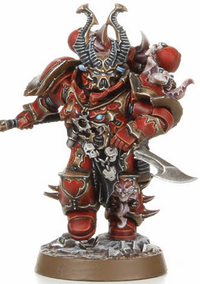
Essentially the Chaos Marine's take on Artificer armor, given only to champions favored by the Chaos Gods. A blast from the past editions, Fleshmetal Armour is how it sounds. After spending gods knows how long in the Warp and centuries of combat under chaos, it eventually caused a chaos marine's power armor to fuse with their own flesh, forming an incredibly hard, organic carapace, tempered by ceramite and reinforced with warpfuckery.
Once a marine receives this gift, they're now more literal weapons than ever, as the armor cannot be removed anymore (since its now their second skin), condemning them to an eternity of unending war. Of course, since Chaos Marines live for that kind of thing, its more of an encouragement than anything.
Just about any Chaos special unit or veteran has fleshmetal armour, like Obliterators and Chaos Chosen.
-
Obliterator
Aegis Armour

The Power Armour of the Grey Knights, Aegis Armour is master-crafted on the forges of Titan and inscribed with prayers and wards to prevent Daemons from possessing it. Early fluff insinuated that a psyker was sacrificed as part of the machine spirit of the armour (GRIMDARK) but this aspect has been downplayed massively. Based on parts from Marks VI, VII, and VIII, within the breastplate of each set is a copy of the Liber Daemonica. It frequently bears a Stormbolter on its left forearm, keeping both hands of the wearer free to use. There is an Aegis/Grey Knight version of Terminator and Dreadnought armours, too. Just remember to keep any observations that Aegis Armour look in anyway similar to Tau Battlesuits to yourself.*BLAM*
-
Variant 1 -
Variant 2
Auramite Armour

The most common power armour within the Adeptus Custodes, it is straight up in the top 3 power armours of the Imperium, its other contenders being the Aquilon & Allarus terminator armours. The material used for its construction is known as, you guessed right, Auramite (which is ceramite, except even better): The first samples and tech to make it was brought back from the depths of Terra. The armour itself is even better than artificier armour and include a refractor field, essentially giving it the same properties in-game as terminator armour, it can even get a teleportation transponder as well as an Arae-shrike: a nasty (so nasty the Mechanicum declared it blasphemous) piece of archeotech that fuck up nearby cogitators. The only ones allowed to make it, like all custodes-grade weapons, are Emperor-chosen clans of Terra.
Terminator Armour

Set aside for space marines who are exemplars of toughness, martial ability and wonky proportions, or an inquisitor, Terminator armor, or Tactical Dreadnought armor, provides the best personal protection available. Heavily layered with adamantium and indestructible pauldrons, a suit of Terminator armor is meant to steamroll nearly everything, and gives a fighting chance against everything else, which is anything that gives anybody else a fighting chance against Terminators. Standard loadout for Terminators are power fists and storm bolters or Power weapons and twin linked bolters for the Chaos variant, but they are able to fit a shoulder-mounted Cyclone missile rack, equip heavy weapons systems, and arm with other killtastic melee weapons. Since most suits are about at least as old as the chapter that owns them, and that the pauldron allegedly contains a tiny fragment of the Emperor's own power armor, these suits are holy relics as well as top-quality wargear.
Despite all the pain they lay down (and keep away), Terminator armor has a few serious drawbacks. First thing is that it is seriously hard to make. Seriously. Most chapters have only a handful that they can distribute amongst their veterans and officers, and any lost suits are damn near irreplaceable. Second thing is that they lack mobility. They counter this mostly since Terminator armor can be safely teleported from orbit into the thick of it, and judicious use of teleport homers can put them right where you need them, and a Land Raider can carry small squads. Beyond that, Terminators are otherwise going to be footslogging since they're too fucking huge to hitch a ride on anything smaller than a house. Unless you're fighting a fast or a crafty opponent, you won't care anyways.
Terminator Armor had 3 major designs. the Cataphractii pattern, the Tartaros pattern, and the Indomitus pattern. The Cataphractii Pattern was the first run at Terminator armor, developed after the Mk.III power armor and sharing many systems. Bearing much larger power field generators and thicker armor, it provided better protection than future variants, but was much more unwieldy and difficult to use. In game terms, you get a 4++ and S&P. The Tartaros Pattern shared many of its systems with the Mk.IV power armor and was much more maneuverable than its predecessor, but gave up some of its protection to do so, becoming more like contemporary Terminator armor. The Indomitus Pattern is the current pattern of terminator armor (though the Forge World books make it clear that it was common at the time of the Heresy, perhaps more so than Tartaros and Cataphractii), sharing similarities with the Tartaros pattern in terms of functionality whilst being cheaper to produce. It also gave rise to the experimental Gorgon pattern, a design that was being tested during the Heresy by the Iron Hands Legion. There are also human-sized suits of Terminator armor, but the tiny amount of them that still exist are used exclusively by the Inquisition.
After the Horus Heresy, Cataphractii pattern had eventually fallen out of general use; this may have been because the last of that armor was either lost and the pattern became another lost technology in the following years. Or because production was ceased in favor of later patterns, and most suits were either cannibalized or became chapter relics that wouldn't see field use again until the day GW released the Angels of Death supplement (no doubt because they'd sell more copies of Betrayal at Calth if both 30K and 40K Marine players could use it).
Finally, there was one more pattern of Terminator armour, called Saturnine. It's got the hugest pauldrons one can get before moving into walkers category and was famous for it's extreme bulk, durability, cumbersomeness and difficulty of piloting - basically everything good and bad about Cataphractii turned to eleven. It never went out of field testing phase, since new smaller Castraferum Dreadnoughts could do everything Saturnine was designed for (boarding actions and indoor/tunnel fighting) better and without it's numerous drawbacks except for needing a half-dead Astartes. Some legions still had their batches of test suits when Horus Heresy hit and used them to gain whatever edge over their opponents they could, but they were never seen after the Heresy.
Extermination claims the Alpha Legion used five patterns of Terminator armour during the Invasion of Paramar, suggesting that other patterns are yet to be revealed. Or, you know, the Alpha Legion being what it is could mean that their in house artificers are straight up inventing new technology.
Centurion Armour

Since somebody at GW forgot that the Xzibit meme wasn't funny anymore, Space Marines now have centurion armour that they equip like a miniature walker vehicle, more like a mini-mech, a cute little dreadnought preparing space marines for their life after living. Centurion armour is "worn" over regular power armor, giving better protection (like terminator armor without the invul save but with an additional wound, along with +1 to both S and T) and comes in two flavors: assault and devastator. Assault centurions are heavy assault units equipped with drills and meltas or flamers, meant to get in close to enemy strongpoints and fortifications and wreck shit. Devastator units are heavy fire support units with hurricane bolters and twin-linked heavy weapons, which, in practice, provide less fire power than regular Devastator Squads, but higher resilience and mobility, as the suits have Slow and Purposeful.
Fluffwise, the machine spirits on this thing is advanced, almost on par with the Land Raider's. There has been once instance where a group of Salamander Centurions were deployed to clear out a Dark Eldar incursion. The Dark Eldar released a toxin that liquefied people into soup and the marines wearing the armor eventually perished after their suits took damage and the toxin leaked through the cracks. A bit miffed after the loss of their pilots, the Centurion suits' machine spirits continued to fight on, even after their pilots were just fleshy goop at this point. They were eventually disabled, but not after killing scores more Dark Eldar during their rampage.
Warhammer 40000: Space Marine

In Warhammer 40000: Space Marine, the Marines are wearing what looks like regular Mark VII Aquila Armor. However, it appears to be far less bulky in comparison to similar armor portrayed in official artwork or Dawn of War, suggesting it might be different. For one thing, it appears to be much more streamlined, with lower pauldrons that aren't quite as fucking enormous (although still unrealistically huge), and with more head room and mobility in the arm sections. This becomes very apparent when using ranged weapons, like the Bolter. This streamlining was likely done to avoid hilarious amounts of clipping. Judging by the fact that every other suit of Imperial power armour in the game - Chaos included - shares this appearance, it is probable that it is simply a reimagining, or a 'realistic version' of regular Space Marine armour. It's not like the Space Marine game is the first artwork to portray power armour with different proportions to other media.
Human Power Armour
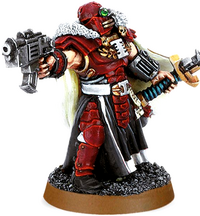
Virtually identical to Space Marine power armor, these suits of armor are scaled down to fit regular humans (notice that this is the reverse of what it would have been 10,000 years ago). Human power armour is relatively quite rare, since it occurred to somebody that making good protection being an affordable and wide-spread asset would severely impinge on the current state of grimdark, not to mention expensive.
Without the extra room and black carapace interface Marine armor provides, many suits of human power armor don't offer the same degree of protection, as much strength enhancement, or as many subsystems found in Marine armor. Still, the wearer will still be stronger, better protected, and better equipped than the guy in cardboard.. There are a few variants, including a lighter suit and one for Chaos-fighting Inquisitors. Because these things are still super-rare, usually only people rolling in money, tech fetishists, and those able to declare not giving them power armor is heresy, will have any.
Sisters of Battle Armour

Less bulky than the Space Marine armour, as they're designed for normal sized humans. Despite Astartes & Sororitas armour both giving 3+ saves on the tabletops, in actuality the power armour of the Orders Militant of the Adepta Sororitas provides less ballistic protection than Space Marine armour does. (The identical in-game protection is mostly because saves in 40k are decided on numbers between 2-6, so there aren't as many gradients in-between.)
This armour also does not provide the same level of strength enhancement, but it gives enough to carry heavy bolters and ammunition into combat, and fire them without a sister shattering her arms. Sororitas armor has noticeably smaller pauldrons. The leading theory behind why they chose this design feature is that smaller pauldrons cut back the material cost it takes to create this variant, without having to sacrifice the pair of perky, globular breasts.
Helmets are not included as standard either, mostly because the majority of Sororitas models have spent hours doing their hair distinctive haircuts. But also because (according to Dark Heresy), the Sisters of Battle do not receive their helms until about halfway through their careers (how the sisters of battle are expected to fight in environments hostile to human life then is anyone's guess). This makes them inverse of the tradition held by the Astartes, where higher ranking officers are more likely to ditch their helmets instead.
The advantage of Sororitas power armour, though, when compared to other human-scales of power amour, is that it runs off of the same fusion reactor that Astartes armour does, and therefore can run indefinitely, rather than for a few hours at a time. Another advantage is that it is not as bulky so it does not turn the wearer into a big giant target either.
Sisters of Silence Armour
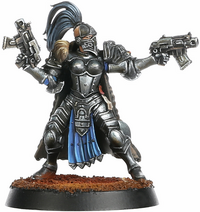
Exclusive to the Sisters of Silence, this is what the Null-ladies get to wear after finishing their training. The Vratine Armour is the armour of oath, containing designs akin to Space Marine Power Armour and possibly a local pattern from Luna (Selenite void-mail; Selene being a goddess of the Moon in ~~Greek~~ ROMAN mythology). Considering that the suit does not come environmentally-sealed like how Power Armour usually do (as you can see that the "helmet" is actually a full-faced mask) – though additional gear can be equipped to operate in a hostile environment – this armour that these Sisters wear is possibly the closest thing the Imperium has to the Mark I, which is also a Power Armour pattern that is not sealed.
On the other hand, the Sisters of Silence might have been a later addition to the Imperium over the course of the Great Crusade, and the design elements of the Astartes Power Armor is actually derived from a later pattern such as the standard Mark II, or maybe even up to Mark VI, assuming that the armour, like the Space Marines', has several renditions of itself. This is likely since the Vratine is designed with agility in mind, and the protection factor is also definitely not compromised for that.
Dragon Scale Armour

Dragon scale armor is basically Mechanicum power armour, commonly used by militant Enginseers of Imperial Guard and Myrmidon warrior priests of the Ordo Secutor. It does not have an external power source, as it derives power from Mechanicus implants (and therefore cannot be used by anyone outside the tech-priesthood or high-ranking Skitarii). Not as thick as Astartes power armour, it sports many more inbuilt devices and sensors and gets further pimped by the Techpriest wearing it as he progresses through the ranks of the Adeptus Mechanicus to the point where it's hard to tell where the armour ends and its wearer begins. Some wonder if it is connected to the Void Dragon.
-
Myrmidon Secutor -
Myrmidon Destroyer
Tau Battlesuits
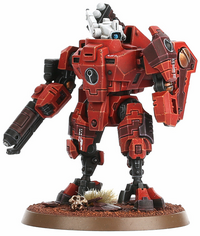
Tau battlesuits vary from straight examples of power armor like most of the kinds of battlesuit named "stealth suit" to mini-mecha like the Crisis Suit to full on humongous mecha from the Riptide and up. They're described in more detail in their page but largely the same principles as human power armor applies to Tau battlesuits.
Eldar Armour

The Eldar use Mesh Armor technology to supplant their powered armor suits, said armor is made out of a combination of wraithbone and thermoplas, all woven together to make a futuristic mail armored suit. The suit is psychically attuned to the wearer's mind, so it is capable of tailoring its fit and use to the wearer's style.
Unlike Imperial powered armor, which is designed to shrug and deflect shots (hence its bulkiness); mesh armor instead scatters the force of a hit throughout the armor, weakening the overall impact of a hit the wearer takes. Its also supposedly heat-resistant, making it effective against energy-based weapons like plasma or lasers (not that you'd notice crunch-wise).
While this doesn't seem like much protection, keep in mind that the Eldar are capable of such rapid movement and reaction that its only matched by superhumans, followers of the cocaine god(dess), and their edgier brethren, along with the standard Eldar doctrine of emphasizing on mobility and precision. Hence, Mesh armor isn't really designed to withstand withering amounts of damage like how marine armor works; its designed to keep the wearer agile, yet still sufficiently protected.
There are currently a couple variants:
- Mesh Armor - Standard armor worn by guardian squads. Its also equipped with life-support functions and sensory equipment.
- Aspect Armor - Aspect armor are worn by Aspect Warriors. Each aspect shrine has their own take on Aspect Armor depending on their role, so Swooping Hawks and Howling Banshees have lighter armor, while Dark Reapers and Fire Dragons have heavier armor to help them shrug off hits. The main thing in common they have though, is that they're much more durable than standard mesh armor.
- Exarch Armor - Aspect armor worn by Exarchs. Because of the Exarch's seniority and experience; the armor is typically much more blinged out than the standard variant, offering the wearer more protection and other equipment options. Exarch armor is also adorned with the spirit stones of deceased Exarchs, bestowing the wearer with literally millennia of combat experience from past heroes.
- Phoenix Armor - The armor worn by the Phoenix Lords. Is so expertly made that it can withstand all but the most powerful and/or luckiest of hits, even after thousands of years. Phoenix Armor also stores the consciousness and memories of the original wearer, so in the event a Phoenix Lord falls in battle, he will be instantly revived when another living Eldar dons the armor again (although it has the questionable effect of completely overriding the future wearer's mind, with the Lord effectively making the unfortunate recipient a flesh puppet.).
- Rune Armor - Mesh armor worn by warlocks and farseers. Along with standard mesh armor tech, the suit is also inscribed with several runes that afford the wearer a greater deal of protection from damage, and also to better attune them to psychic energy. It also comes with a layer of wraithbone for more protection.
Dark Eldar armour (when they wear it) very rarely gets to the point of being as tough as heavy Aspect armor (with the exception of Incubi armor, which practically is Striking Scorpion Aspect armor) as befits the extremely fragile nature of the Dark Eldar army because GW loves Craftworlds way too much. It is however considerably spikier.
Ork Armour
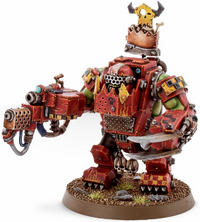
The only known variety of Ork power armour is Ork mega-armour, a direct Orkoid equivalent to Astartes Tactical Dreadnought armour. Mega-armour is essentially exclusively worn by the elite of Ork society such as Nobz, Bosses, and Warlords; further ensuring the deadliness of Ork mega-armour users. While slow and clunky (as is represented by slow and purposeful) and lacking the energy field protection/indestructible surfaces of Tactical Dreadnought armour (hence the lack of an invulnerable save) your average Ork nob is considerably hardier than your average space marine (hence having two wounds) and an Ork warboss is even tougher than that. However it seems that the Orks have not created quite as many weapons to go along with mega-armor as humanity has created systems to go along with tactical dreadnought armour. Unlike Terminators, Mega-nobz cannot teleport, and while a Space marine storm bolter/combi-bolter is roughly equivalent to an Ork Kombi-shoota, mega-nobz are not really known to fit any other kinds of ranged weapons onto their suits besides swapping out the second barrel of a kombi-shoota for a rokkit launcher or a skorcha. The only known exceptions to this are Ork Big meks, and certain Warbosses/Warlords who might fit a unique gun or a Big shoota (if they're gazghkull) or a kill kannon or megablasta if they're Gorgutz. For melee weapons, nearly every ork mega-armour user uses a power klaw, which is a direct equivalent to the human power fist, though some rich orks may choose to trick out their power Klaws, most notably Gorgutz who tricked his power klaw out at both Kaurava and Kronus, even having the damn thing be constantly on fire and at Archeron has decided to fit a launcher and chain system to his power klaw to act as a give grappling hook. Another weapon used is the Killsaw, which corresponds most closely to the chainfist, although it seems most Mega-armour wearers choose to fit killsaws to both hands rather than just one to make them extra choppy.
Orks don't often wear full face helmets, generally preferring at most an iron gob to protect their jaws paired with a relatively simple cap helmet (usually horned), but some will go the full distance to protect their faces with helmets best described as full faced welding masks or helmets taking after their warhammer fantasy counterparts' black orc helmets. This tendency for Orks to not cover their heads adequately has been exploited by Ciaphas Cain at the very least who, when rushed by an Ork Warboss managed to get a victory against an opponent capable of crunching a squad of space marines like toys and stomping many a Space marine Chapter Master or Chaos Lord into powder by emptying his Laspistol's magazine into the Ork's head since the rest of the warboss was way too well protected for his chainsword and pistol to make much impact.
One advantage Ork mega-armour wearers have over their Space Marine counterparts (loyalist or otherwise) is that Ork Mega-armor wearers can ride on just about any Ork transport and get stuck into the fight almost immediately while terminators will need to wait for a stormraven, land raider, or spartan assault tank to do the same. Meanwahile a few Nobz can get into a trukk and drive furiously at the enemy to shove some power klaws and killsaws up some place unpleasant. For many Ork players, this more than makes up for the lack of deep striking options for Meganobz as it provides for a cheap and quick delivery system for their otherwise plodding Meganobz to get into the thick of combat to smash some faces in.
Another thing to note that with Orks it can often be very hard to tell an Ork-meganob apart from an Ork who just so happens to have a lot of bionic gubbinz attached to him.
Fallout Power Armor
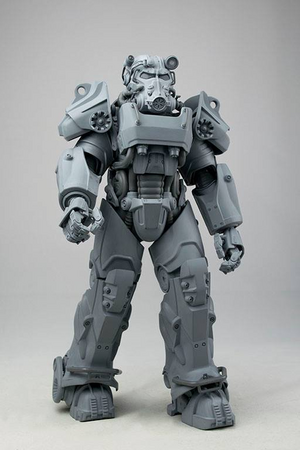
Unlike Warhammer 40,000, Fallout powered armor is Fluff-wise more "power" than "armor". It was originally made to allow troops to use heavy weapons on the move and with increased weight limit it was obvious to put some extra armor on the exo-suit. Even while it turns you into a nearly-indestructible walking tank, there is no shortage of stupidly powerful and/or armour-piercing weapons in Fallout, so sneaking and camouflage are always considered better protection than armor, so the main reason people use it is strength and radiation resistance bonuses. It is also possibly the most realistic armor here, strangely. Around Fallout 1 and 2, power armor was an almost cheat button up to the endgame, with an obscene bonus of +3 STR and near immunity to all small arms fire up to energy and heavy weapons(and Gauss in Fallout 2)
Afterwards came Fallout 3, where a leather jacketed character high on morphine could soak more damage than a sober power armored dude and mow him down with a cheap Chinese assault rifle. It had become a glorified metal full plate, met with RAGE until New Vegas came with some decent power armor, though it still got overshadowed by a badass riot armor that didn't need training(Lonesome Road DLC) or a clingy female AI driven stealth suit(Old World Blues DLC).
Power armor got a massive overhaul in Fallout 4, turning them into basically an infantry fighting vehicle rather than just better armor. The crafting system extends to upgrades and new systems for the armor, including neat stuff like a stealth field and a jet pack. On one hand Fallout 4 is one of the few games where power armour feels like actual power armour and not just the best armour you can get, but on the other, it was so strong they couldn't help but give it to you right at the start of the game (because working towards rewards requires an attention span they don't think we have, apparently) and had to change the fact power armour comes with an internal battery so you could only use it until you ran out of fusion cells.
T-45 Powered Armor

The first generation of power armor to go into the field, the T-45 series was rushed into service to hold back the invading Chinese from taking over Alaska. It worked and contained the invasion, but had a lot of problems. Later used on the homefront. The T-45d is most commonly seen in the Capital Wasteland.
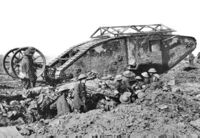
After Bethesda got the rights to make Fallout 3, they were like "Guys, guys, let's make a SHITTY POWER ARMOR!" and they went through with it. The result was far from shitty a mixed bag. Sure, it has -2 AGL, less radiation resistance, and makes you move around like the Comic Book Guy from The Simpsons, but it looks BAD-ASS!!! Noted for using fusion packs and batteries to power the suit like a RC car, which made recharging quick but ran out of power often (though naturally this wasn't incorporated gameplay wise until Fallout 4). Most suits after had a internal reactor that allowed them to basically run forever (until Bethesda retconned that too).
NCR Salvaged Powered Armour

This is the 'zombie' version of the T-45d. After the Battle of HELIOS One, the NCR recovered many suits of T-45d from fallen Brotherhood Paladins. Before issuing them to heavy weapons troops, the NCR stripped most of the "power" part of the armor, and instead of teaching them how to use it properly just slapped on a cheap air conditioner in it and made their heavy units wield them like full plate armor. It's as retarded as it sounds.
It's use is less for practicality and more as a moral and political tool, basically letting the NCR brag "See? We got power armored troops too!" without actually having the knowledge and technology to build and maintain said troops. Crunch-wise it is utterly fucking useless with an obscene agility penalty and weight.
T-49 Powered Armor
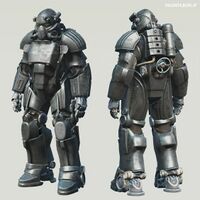
Best well known for being worn by the titular Storyteller (a fan made lore project that became so big Bethesda actors were appearing on it's show and is practically just short of canon now) the T-49 was a prototype originally expected to succeed the T-45d by improving a number of engineering shortcomings while lowering the power cost to keep the suit running. It even came with a optional modification to make the suit solar powered, only draining it's fusion core when not in direct sunlight. Only a small number were produced however since the in built fusion reactor of the T51b armor made most of it's power based features obsolete. Only a couple of suits have survived to the modern day and are more considered collector items then military equipment.
T-51 Powered Armor

The second generation of power armor, the T-51 series managed to get all the kinks ironed out. Used to kick the Chinese out of Alaska and invade China. The quintessential Fallout power armor suit. The T-51b variant is common among the West Coast Brotherhood of Steel. Two suits are known to be in the Capital Wasteland.
This armor only has +1 STR for some reason. What's even stranger is that the hunk of metal that you put on your head (AKA the helmet, but who calls it that?) gives you a +1 CHR bonus (probably because it's heavily featured in old world propaganda, but yet again, so was the T-45d variant). We really should be wearing around hunks of metal on our heads these days. After all, this armor be pullin' all dem bitches...
T-51b is the most advanced power armor that existed in the world before the Great War. At least it was, until Bethesda decided to change that in Fallout 4, even though this fact was well established nearly two decades before Fallout 4 came out.
Used as the standard armor for Paladins, the suit has become an icon (both in universe and real life) for the Brotherhood of Steel.
X-01 Power Armor
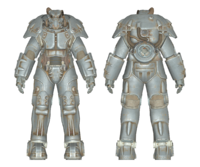
The Enclave rolled out their advanced power armor in 2220. It went through several upgrades and variants through its operational history, like the Tesla armor, which has improved energy resistance, and Hellfire armor, which has improved insulation against heat (for which the flame weapon-armed troopers who wear them are grateful). It can be encountered, in all of its variants, on the West Coast, the Mojave Wasteland, the Capital Wasteland, and the Commonwealth (the latter is, however, strange, since neither Enclave's bases, nor even evidence of Enclave operations are encountered in Commonwealth. Except from one children of atom zealot in Far Harbor, who says he was part of the Enclave. Still doesn't explain the Nuka World Quantum Armour though. Bethesda sucks at continuity.).

It's implied that the newer versions of the armor as seen in Fallout 3 is actually a sort of stripped down 'urban' version of the armor. Like their stripped down plasma rifles they are designed to be easier to maintain and build, most likely due to losing most of their resources and production facilities after the war with the NCR. While, like their plasma rifles, the redesign is shit compared to the original the fact it's lighter and provides easier (MUCH easier) movement better suits the more enclosed city environments where being a walking tank just gets you suck in door frames all the time.

The Hellfire armor further suggests that the enclave are attempting to close the gab, combining the cheaper more agile qualities of the newer design with the protection of the earlier designs.
T-60 Power Armor
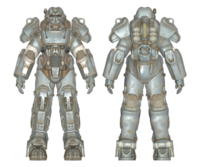
A new addition to the series in Fallout 4. Technically retrofitted T-45 armor, and originally just intended to be a visual retcon of it by the developers, before Bethesda decided to make the new design its own thing. While there certainly were ways to make this a post-war power armor, Bethesda instead decided to make it the best power armor that was available before the Great War, which since Fallout 1 had been T-51b. Many long time fans of the series did not approve of this decision. Probably the worst quality of this armor is the fact design wise it's just a T-45d with more metal plates bolted onto it (seriously it has pauldrons for it's pauldrons!) so why it's not just waved away as being T-45d upgraded to work alongside T-51b really just prove how bad Bethesda is at incorporating new lore.
Horned Power Armor
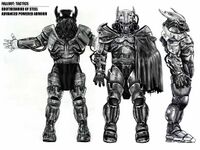
Used in the semi-canonical (due to New Vegas, Fallout 4) Fallout Tactics (Bethesda's offical stance is that the major events are canon, but many fans choose to believe the whole thing is canon) the Horned Power Armor is used by the Midwestern Brotherhood of Steel with it's defining feature being, you guessed it, horns. The Midwestern Brotherhood stands out as fully incorporating itself into wasteland life, offering protection to tribes and towns in return for resources, recruits and information. This in turn is shown in the design of the armor, being the only suit designed from scratch by a Brotherhood faction since the war. Designed for mass production over protection (similar to the more recent Enclave designs) the armor still incorporates many mechanical elements from the T-51b such as a internal reactor. It's also slimmer and less bulky then other armor designs (though not on the same level of the newer Enclave designs).
Overall the armor is a compromise between mass production and protection, with heavy modification possible due to the more scrappy way it is produced unlike the more industrial Enclave. While it is numerous enough to equip all of their Paladins (keeping in mind their numbers are MUCH larger then other chapters) it still leaves more of the lower ranking infantry to use more traditional protection.
Raider Power Armor

Raiders in the Commonwealth have managed to refurbish power armor frames. They weld together scrap to make external armor plates. Raider power armor is the least versatile & weakest of all the armor types. It's complete shit against anything that has a caliber above 38. and laser pistols can kill the user within 4-5 shots. Turns out a bunch of drugged-out vindictive assholes who shun society are not the best engineers. Still looks metal as hell though.
Rifts Power Armor
The RPG Rifts has sooo much power armor, there's entire books devoted to listing different models of the things. Perhaps the most notable and iconic is the Glitterboy, named for it's shiny reflective armor, but most famous for the Boom Gun, a huge railgun so powerful it has to anchor itself to the ground with extendable pylons to keep from being knocked on it's ass every time it's fire, and which produces a sonic boom loud enough to deafen even superhuman foes wearing enclosed armor.
The main armor of the Coalition States is the flying SAMAS armor, which is cool and all and has mini plasma missiles but lacks a gigantic boom gun. Even though the CS views the design as their sole property, since it's based on a pre-cataclysm design a couple groups have their own.
Less common power armors include Centaur armor in case you want some extra horse legs, dinosaur power armor, the Angrar armor which is actually a pissed off demon who tries to corrupt you, and Chipwell armor, which cuts out all the super advanced alloys everything else uses and replaces them with something approximating tinfoil, for your bargain-basement power armor needs.
StarCraft Power Armor

In StarCraft, the Confederate Marine Corps Power Armor, more simply called the CMC power armor, is the standard powered armor suit used by all military factions within the Koprulu sector. Despite the fact that each armored suit comprises a complex array of sensors and other advanced combat technologies, life-support systems, and its own independent power supply that appears to be a portable fusion reactor, it seems to be dirt-cheap as hell to manufacture, given that every armed force within the Koprulu sector can give one of these suits to every Terran marine worth a damn. Unfortunately, that technology doesn't seem to grant much actual protection; the marines are usually unceremoniously wiped out by the dozens hundreds during an engagement.
Along with that, however, it's not exactly known if the armor plating on the suit can protect the wearer from actual combat damage. The CMC armor is incapable of reliably protecting the wearer from projectiles, ruptures, or chemical attacks (apart from the passive hazards found in NBC environments), in both fluff and crunch, considering that it cannot hope hold out against: zergling claws, roach acid, the Marines' own gauss guns (hell, it can't even deflect the pistol rounds from their sidearms), fire and/or plasma, hydralisk spines, Mutalisk wurms, Psi attacks, Protoss photon guns, and really just about anything. Then again even tanks, huge giant robots and battlecruisers could not hold against said attacks en masse - this might say more about how nasty are weapons in StarCraft universe rather than how shitty is armor there, or more likely it's how real world armor works. In fact, some of the fluff describes it as existing more to protect the wearer from the recoil of the Gauss than anything else. In addition, Starcraft armor is primarily ablative - no armor in the game renders anything in the game immune to damage. However, it should be noted: Fluff stated at certain points people got blunt force trauma'ed to death by the gauss fire event inside the suits. Besides that, acid, if applies to joins in the suit, burns through those and note the armor. Since mind attacks are, well, mind based, armor ain't gonna do shit. It's really just Spess Suit first, armor second.
Other variants exist, based on specialised functions. Medics wear a light armor that isn't designed for combat, but which carries advanced field surgical equipment and even some minor cybernetic construction equipment, allowing them to patch up wounded troopers and fix their busted armor. More visually distinctive is a model of power armor worn by Firebats. The armor is much bulkier than the standard armor, which keep in mind was already similar in size to terminator armor, especially in Starcraft II, where the thing's arms and pauldrons are bigger than its legs. Since the the armor's bulk makes it thicker, it can take far more abuse than the regular armor. As the name of unit might indicate, the armor uses a pair of built-in flamethrowers. The armor worn by Marauders in Starcraft II looks almost identical apart from a change in color, and has the same durability, but in place of flamethrowers uses grenade launchers that are best used against armor. The visual similarity between the two is neatly explained by the fact Marauder armor is rebuilt and re-purposed Firebat armor. Despite the armors' size (and concomitantly longer legs), the guys using them are just as slow as regular marines (oh come off it, the legs aren't much longer. they're lucky to not be slower). A third type of armor is made for Reapers, which looks similar to Assault Marines except their jetpacks are bigger.
Less well known, but still present, is the armor worn by the Protoss. This advanced alien armor, although considerably more "ceremonial-looking" than Terran armors, is actually significantly more durable. Not only is it comprised of more resilient materials, but it contains built-in devices that convert the bearer's psionic energy into a forcefield; though this is depleted by absorbing damage, it will eventually regenerate, if the user survives. Presumably, it also provides environmental protection, though that may have something to do with the fact that the Protoss' alien biology makes them hardier than humans, even without armor they can take more abuse than any Terran CMC armor variant. The common "Zealot" armor also has wrist-mounted devices that can focus psionic energy into energy-blades, which they use to rip 'n' tear shit. Dark Templars use similar devices to create "void blades", whose alien energies are one of the few things that can permanently kill "ruler" type Zerg such as Cerebrates.
Starcraft armor is often mocked for looking fat and bulbous, something which grew more pronounced in Starcraft 2. This is also worsened by Starcraft suffering from "elephant sealitis" much like Warcraft, where the men tend to be so big in comparison to female models that you wonder how anyone has heterosexual sex without breaking female half of the equation. The pre-rendered CGI models aren't too bad about this although they certainly are on the fat side of armor design when the general trend in scifi aesthetics has been to make things sleeker and slimmer, but the in-game models are pretty awful about this. The Starcraft 2 Firebat and Marauder look tubbier than the god damn Centurion. The very fact that Starcraft's power armor manages to make Space Marine armor look slim and sexy is the source of a tremendous deal of derision from Warhammer fans.
Metroid Power Armor
AKA the "Power Suit" or "Chozo Power Suit", and one of the most powerful armors on this list. Like Starcraft, pretty much every scrub gets a power suit in Metroid (especially if you're with the Galactic Federation), but the main character's suit is the one you probably want to know about. Samus Aran's armor is like a wearable, form fitting Titan, designed by magic bird people who took Samus in after her parents were killed. It completely kicks the shit out of basically all other technology in the Metroid universe; while a Federation plasma cannon is as powerful as a charged shot of Samus's Plasma Beam (which slices through aliens like a knife through warm butter), it's also nearly as big as a person, takes several minutes to charge, and requires a heavy power pack, while the proper Plasma Beam is integrated with all of Samus's other weaponry into her forearm-sized cannon, takes seconds to charge, absorbs ambient atmospheric energy to function, and is so energy-efficient it doesn't dip into her suit's resources whatsoever.
But that's not all, it's ridiculously modular and can accept pretty much any piece of technology ever and turn it into an upgrade, even if the Chozo had never once encountered the technology in question! Samus doesn't have any idea of how this works either but more or less all she knows about the suit and its functions is that it works.
When fully upgraded to end-game status, the Chozo suit is an unstoppable engine of destruction that's not only ludicrously durable but also incredibly fast and amazingly well armed. The only real flaw in its design is that it is stupid easy to knock all of its power ups and reset to default -- Samus never manages to hold onto her upgrades between games, though it could be because as we know that power ups can be destroyed (from metroid prime), she decides to just store them somewhere safe when she doesn't need them since most of her power ups are relics made by a species no one has seen a living example of in years. Like all Power Armours worth their name it also has pauldrons; the default pauldrons are actually pretty small, but add a Varia upgrade (where some materials have listed the pauldrons as a cooling system associated with the upgrade) and she can shame even the most ridiculous Space Marine. However as Metroid has grown older, Samus' suit has become sleeker and more form fitting. In the transition from Prime 1 to Prime 2, her varia suit became considerably sleeker, with the most notable changes being that her visor went from a T to a Y and that her pauldrons went from going to a bit above her brows to being low enough to offer her full peripheral vision. This suit design was kept as the official one (super smash brothers brawl's preference of the 2-D style "straight visor" suit notwithstanding) until Other M.
Until other M, the sleekest and slimmest power suit was the light suit, where the pauldrons were downright tiny and looked like something that would allow a full range of motion, meant to emphasize just how advanced and glorious the fusion of chozo and luminoth technology was. Then Other M came and essentially made the Light Suit's proportions the standard, with the pauldrons now being at most going up to her chin if not shorter. Whereas her older suits were bulky and androgynous, right now her default armor is pretty obviously worn by a woman even if it lacks anything egregious like boobplate or high heeled boots thanks to its pronounced hour glass figure. While not subject to as much criticism as the Zero Suit this redesign certainly has a lot of people who aren't really much of a fan of it. Whether it's out of simply disliking the aesthetics or that Nintendo's preference for it seems to be them showing favoritism for the extremely contentious Other M game over the almost universally beloved Prime trilogy is dependent on who you ask. To be fair, there's as much criticism of the Zero suit for looking like impractical fetish gear as there is criticism for it overshadowing what should be Samus' default appearance in marketing in an attempt to appeal to waifu seeking weebs.
In Metroid, Power Armor seems to be a ubiquitous and easy to manufacture technology. Basically the entirety of the Federation military, both Marines and Army are equipped with it. All of the hunters in prime hunters could outfit themselves with shields comparable to Samus' own suit, and one of the hunters; Sylux (Metroid's resident ensemble dark horse and probable pretty boy given Nintendo's recent male character design) has a suit of power armor that's basically equally matched to Samus' when both have a similar level of upgrades in every way. Notably Sylux's armor is said to most likely be a stolen federation prototype from a black ops research base that was destroyed some time ago, as is his ship. So clearly the Federation was aware of the massive gap in capability between their troops and Samus Aran and was trying to rectify it until whomever Sylux is stole it and totaled all of their research on the project. However by Metroid Fusion it seems the Federation at least has the ability to replicate the software portions of Samus' technology, which has some disturbing implications given that Fusion exposed the rot at the Federation's core.
As for how Federation grunt power armor performs. Federation Marines seem to be generally evenly matched with Space Pirates who seem to be greatly physically superior to the average human based on the athletics they constantly do. Whether or not it's shielded is unknown, but twenty or so marines made a pretty decent last stand against a hugely numerically superior force of Ing possessed Splinters (dog sized predators who seem to be aether's equivalent of wolves and who become much more durable when possessed by the Ing) before being inevitably overwhelmed by their enemy's sheer numbers. The Demolition troopers whom you have to escort in the last leg of the pirate homeworld's arc of Metroid Prime 3 to destroy a gate blocking the way to the phazon leviathan can also more than pull their own weight against the unending hordes of Space Pirates the Pirates will throw at you the moment they realize that you're on your way to destroy their leviathan. And their armor is actually noted as somewhat weaker than is standard for Federation marine armor (which...doesn't make a terrible deal of sense for soldiers whose job it is to handle explosives in the face of heavy enemy fire, that's a kind of job where you would want as much armor as you can get away with having) which makes it even more impressive.
There's also Federation Force's clunky Golem project Mini-Mecha but the less we speak of Federation Farce the better.
Halo Power Armor

Most people think of the Spartan power armor when they are asked about Halo. These suits cost as much as a UNSC ship and have the decency to protect the wearer from multiple Fuel Rod shots, despite being penetrated by a single pistol shot...inconsistency aside the Spartan power armor is in between the strengths of Astartes power armor and the Terran power armor. Unlike most other armors, the enhanced speed and strength given by these things is too much for an ordinary human; anybody other than the Spartans, who underwent genetic enhancements, and had a large wire stuck into their brain, ends up getting mutilated in the armor just by trying to move in it. Other power armor in Halo includes both the Brute and Elite combat harness which boosts their already insane strength (twice that of a human of the same mass for elites, about two or so tons for a Brute) and reaction time (although Brutes tend to be a bit more sluggish than humans).
The energy shields in the power armor are probably the suit's most vital asset, as without them no human, genetically modified or not, could possibly survive eating at least 10,000 rounds in a single battle. Besides this, later games add a number of armor upgrades that radically augment the suit's features, such as a jetpack, bubble shield, EMP blast, etc. Sprint used to be an add-on, for... some reason, but fortunately became a standard feature.
More noteworthy perhaps for the fact it does not cost as much as a spacecraft, does not have pauldrons the size of the user's head and is implied to be halfway to efficient or practical (but if you took away its active ingredient, the shield generator it becomes as useful as wet tissue paper) and is used by the SAS in SPEHSS is the ODST armor, which has both better data analyst equipment than the MJOLNIR and suspiciously similar play style to the piece of junk used in halo 1.
Of course there are the Forerunner Combat-Skins, which the books hype but the games tend to show much less impressive technology that makes the books make very little sense trying to reconcile the two. Whether it is used to dumb down the difficulty to make the game playable or pull out some ill-contrived bullshit excuse to explain why the Forerunner tech can be taken down by the magic of 7.62 NATO rounds is often a point of contention. For example, the books describe mini-mecha suits that can command a million drones or level city blocks but how you can reconcile this with the British B1 battle droids as designed by Apple that make up the bulk of the Prometheans in Halo 5 is anyone's guess. Whilst 343i tried to explain that the Prometheans were the byproduct of a madmen not giving a damn about quality control, it immediately contradicts itself when we see those same Prometheans suddenly blowing up Forerunner starships with the same weapons that many of us considered as 'meh' in the game itself. One also has to remember that Sentinels and Prometheans still have to be close enough to the suits in power to be relevant on the same battlefield before you run into the question that plagues many a superhero team, the age old "how is Hawkeye relevant on a team with Thor and the Silver Surfer?" It certainly doesn't make much sense when the Boredom Eternal/He of the endless recycled boss fights can take on a ludicrous amount of direct tank shots but can be taken apart with a combat knife and is supposed to be some badass guard figure. Then again, Halo isn't really known for its plot consistency and rivals WH40K on how unreliable the sources are.
It is also worth noting that Forerunner armor comes in mini-mecha and form-fitting varieties. Most of the above is for the mini-mecha, while form-fitting armor seems to be substantially less impressive. This is probably reconcilable by the people working on the Games having a completely different vision of the Halo universe than Greg Bear who likely recycled some concepts he had from unfinished books for the Forerunner trilogy. In the mean time, 343 took whatever it saw as having interest for its game ideas (namely the Ur-Didact and Librarian characters) and largely ignored the rest. And of course, Halo 5 had a completely different writer than Halo 4 and Halo 5 is so far regarded as having by far the worst writing in the entire series out of any of the games. Where everyone is out of character, the people who aren't out of character are so boring you won't remember a thing about them after finishing, several plot holes that was pulled out of everyone's asses and absolutely everyone is an idiot and all eight of the main characters are so superfluous to the plot that you could remove them all and not a single thing would change.
While Halo Spartans used to be pretty top of the line impressive for visual scifi; as the Genre has matured the genre has also become full of far, far more over the top settings as it becomes more and more possible to display over the top stunts. Much like how Superman's initial power level quickly ended up being eclipsed by various golden age competitors, a lot of what MJOLNIR armor can do has become so bog standard in science fiction (especially because a lot of its touted in game features are now standard for every FPS protagonist; apparently the first world war was fought by a bunch of wolverine clones, who knew?) that it's lost a great deal of its luster. To its credit Halo has avoided the route Superman underwent back in the Golden Age where he just kept on getting more powerful to one up his competition like Captain Marvel in the comic book superpower arms race; but if you're used to playing Warframe or something like that you can come into Halo wondering why Master Chief is supposed to be special. In which case congratulations for missing the entire point of the Spartans and the Master Chief. They are special because despite the power of their enemies they still manage to win through a combination of dumb luck and mind-boggling courage and tenacity that is intended (and succeeds in) engendering respect and admiration in the audience/player.
Marathon Power Armor
Halo's grand-daddy has two examples:
One is a human full body armor designed to allow the wearer to fight in vacuum. While sturdier than average, it was designed to be used in the aforementioned vacuum first and as an armor second. On the bright side, the integrated power source allows the wearer to use energy weapons with impunity.
The other is the Pfhor power armor worn by the local Elite-equivalents, the Hunters who serve as Heavy Infantry and as dedicated slave hunters. Actually, the more correct description is that the armor is built around the heavy cyber- and gene-engineered Pfhor.
Metal Gear Exoskeletons
Exosuits have featured throughout the Metal Gear series. While not very /tg/-ish, they do deserve a spot on this list for being either balls-out wacky or complete awesome.
Solidus's Powered armor
The powered armor suit worn by Solidus Snake during his rebellion. It uses artificial muscles that grant him vastly increased strength and reflexes (to the point he could parry concentrated machine gun fire with just his swords) and an accelerator that acted like a booster to allow him to travel great distances in the blink of an eye. The suit could "Hulk up", the artificial musculature bulking out for even greater strength enhancement. It was also equipped with an extra pair of limbs called "Snake Arms", very strong robotic tentacles mounted on the shoulders that could also shoot "plasma" missiles. However that works. They probably meant to say Plasma Bolts.
The Octosuit
Solid Snake's signature suit in MGS4, it was made of artificial muscles like Solidus' suit. Because he'd turn into an old fart at this point, the octosuit was less of a performance-enhancing set of power armor as it was a full-body prosthetic. Still, it allowed him to fight as well as his younger self, with the added bonus of the Octosuit passively copying his surroundings to allow him to blend in better. With the added facemask, he could even fully disguise himself to remain totally inconspicuous in public - doesn't work on murderous robots at abandoned military facilities, however it does give him enough strength to knock them over. Of course, Snake should be shooting those damn things when they appear.
Cyborg Exosuits
After the fall of the Patriots, cyborg technology was released into the world. With CNT muscle fiber being as cheap to produce as plastic, just about every mercenary insane enough opted to be augmented and encased in one of these things. This armor enhances the wearer's strength, agility, and durability to absurd levels, basically turning them into unstoppable murder machines that will completely wreck the shit out of anything they face.
The caveat to this is that majority of cyborgs are not mentally sound for a variety of reasons. While some accepted augmentation willingly to enhance their abilities or restore lost functionality (and are thus able to come to terms with their new life), there are many who were forced to undergo cyborg transformation, either through force or grave necessity (a lot of cases were that they were former soldiers couldn't find jobs, either because their home country was in civil war, their country's economy was floored by the post-SOP recession, or they're disabled. So it was either sign up with a PMC to armor up or you and your family starves to death). Those recipients can be injected with fear-inhibiting nanomachines that will force them to fight, regardless of the circumstances, all while their inner self is trapped, screaming, in their mind and is unable to stop themselves.
Some of the more notable examples include Gray Fox, the Patriots' first Cyborg Ninja, who was resurrected and became a guinea pig for further genetic experimentation. His exoskeleton was grafted to his own skeleton to allow him to safely utilize its strength-enhancing features, such as incredible strength and reflexes. However, he wasn't alright in the head. Fox was forcibly brought back from the dead and put into the project against his will, due to this his only ambition in his life is to have one final duel with Solid Snake before finally being given eternal rest.
Raiden was captured by the Patriots and turned into a cyborg in Area 51. Everything from the jaw down was removed and his mandible-less skull and dangling spinal cord were attached to a cyborg body. The increased strength allowed him to break dance with 10-foot walkers attached to his legs and have a stabbing match with a bisexual flamenco-dancing vampire and duel and throw a Metal Gear RAY into the air. A later body, built exclusively for combat, gave him the facilities to fight and suplex a Metal Gear the size of a Warhound Titan, then tear off one of its arms to engage it in a duel and destroy it. The hyper-specialization for combat meant that this body couldn't have a self-repair unit; instead, Raiden had to take fuel cells from other military-grade cyborgs to repair any damage he might sustain and replenish his fuel, by forcefully yanking it out from them and consuming it on the spot.
Sam's Powered Armor
Defying all semblances of coherency; Jetstream Sam, a Brazilian samurai and Raiden's eventual rival, used nothing more than an exoskeleton to give him abilities that not only completely outclassed Raiden's original cyborg body (who, mind you, is able to lift a 30-foot mech and throw it into the air), but be able to go toe-to-toe with Raiden's later custom built body (who is able to bodyslam a Metal Gear the size of a Warhound Titan). By nothing more, we mean he had little-to-no cybernetic enhancements (his only real one is a cyborg arm after losing his sword arm, and even then he was capable of dueling a Metal Gear RAY UG all on his own before getting it).
It did just about everything Raiden's body could do, from repairing itself by ripping out people's spines, grant him unreasonably high strength, and give him fast-enough reflexes to slow down time, deflect bullets using nothing more than a sword. and reliably catch his sword after launching it out of his scabbard at high speed using an explosive quick-draw system. One wonders if cyborg tech is even necessary at this point considering Sam can do all this bullshit without getting his arms and legs amputated. Just like Armstrong he was quite loaded. So he most likely wasted his family fortune on upgrading his weapon and power armor.
Iron Man suits
Probably the most well known Power Armor suit in fiction, popularized by the Superhero who's power is that he has power armor. Tony has built a lot of suits, some meant for a specific purpose, some just a stronger version of older iterations. At the high end, Iron man's suit is flat out superior to anything in nonserialized science fiction short of a few cheese builds from role playing games (but hey, comic books), even allowing him to fight Odinforce Thor, who mind you, has the power of a being who can destroy galaxies as the side effect of his fights. Sure his standard suits may be beaten by weaker stuff, but if he really sets his mind to it, the things Tony can build are essentially magic contained in metal and get shit done!
His armor has been constantly getting exponentially better in recent years. First was the Extremis armor that let him use technopathy in tandem with a super soldier enhancement. Then was the bleeding edge armor which could basically form weapons as Tony needed them from nowhere from living metal. Then was the Endo-sym armor which was not only able to do that but drain energy from anything and output so much energy that it can hurt even energy absorbers. And now he has the Model-Prime armor which can not only do all that but also automatically transform into any other kind of armor he needs whether it's a bulky hulkbuster suit for raw strength or Samurai esque armor when Tony feels the need to express his inner weeaboo. Since the older Bleeding Edge armor is low Hereld level he should be able to fight the gods of monotheistic settings and win against most of them! It should also be possible for Mark L Tony in the MCU to defeat them too. As anyone who lasted more than three minutes in a fight with against Thanos when he has at least four Infinity Stone or more for longer than three minutes has at least Solar System level damage output and durability.
Destroyer Armor
Perhaps the snazziest and most powerful armor in fiction. This creation of Odin (Marvel Universe version) cannot be damaged by anything less powerful than Odin himself (characters who can smash planets to pieces have tried and failed) and can destroy just about anything weaker than Odin in a single hit. Forerunner suit, Starktech? HAH. This is made by gods who actually feel godlike. Crafted by someone who could eradicate entire galaxies as a side effect of his fights to battle even more powerful beings. Accept no substitutes, this is the finest power armor you'll ever find that does not ascend you to Celestial wonkyness. Even if it does run on magic.
Humorously, the Celestials this armor was designed to fight show up in the story and immediately one-shot it. In a bizarre turn of events the armor has become intelligent and now serves Galactus as a herald.
Comic books are weird.
Strike Legion
Strike Legion has teraton pistols, Uzis that can outgun all of WH40K and planet busting grenades. You can survive those in one of these babies. Even the weakest ones have built in shield generators and flight capabilities. That is really all that needs to be said. They are also mass produced. Like, standard issue level mass produced. By factions that can outnumber the Imperium of Man.
X-COM


X-COM always had high-tech armor, including actual power armored suits in the first game. The first one is the "Titan" armored suit, a heavy personal powered armor suit composed of alien alloys. These could drastically reduce damage, give the wearer increased strength and stamina. The other is the "Archangel" armor, while less durable, it instead sported a personal jetpack that allowed the user to hover and fly for limited amounts of time until they ran out of fuel. Finally, there is "Ghost" suit, which get more emphasis on power part of power armor, granting increased mobility and maneuverability, while only being slightly more durable than carapace armor, and as the name suggests, it spotted both passive camouflage systems and active cloaking. They're all fully sealed from the outside-environment and had an array life-support systems, so the wearer was immune to poison, fire, and getting choked to death.
However, in the Enemy Within expansion to the 2012 remake. This came in the form Mechanized Exoskeletal Cybersuit troopers, or "MECs" for short. Departing from the usual type of armor, these require a considerable amount of cybernetic enhancements through the use of the game's Meld resource to use. The pay-off for that is enormous, however. Unlike other low ranking soldiers in X-COM, the MEC troopers are extremely durable (to compensate for their size meaning they can't use cover.), and can use the most powerful guns in the game, that only the MEC's strength and durability allows them to use. Additionally, subsequent rank-up abilities and suit upgrades will further make MECs much more killy, and can improve the small ammo clip of the main gun.
However, while MECs are incredibly powerful, they are not invincible. They are like XCOM's equivalent of tanks, and much like tanks, they tend to draw the biggest amount of enemy fire in the map (This is made more problematic by the fact that even the aliens' basic plasma pistol can be a threat to MECs and the enemy AI will usually prioritize anyone not in cover), very limited ammunition stores which force frequent reloads, and just generally tend to lose against numbers where they're simply drowned by the sheer amount of attacks that come their way. Thus, relying completely on MECs isn't the best strategy, and it is always best to supplement MECs with some infantry for support.
Since the technology for the MEC troopers is taken from the alien invaders, they unsurprisingly have their own version called the Mectoid. The Mectoid is one of their basic troopers, the Sectoid, in their own MEC suit. By the sequel they have phased these out and instead have Advent MECs, which, like the sectopod, are fully autonomous and have no living pilot. The Advent MECs are equipped with giant mag cannons and triple shot grenade launchers. And can jump 30+ feet. Failure to incapacitate (or hack) one as soon as it's encountered will end in much rage. unless you have end game weapons
In XCOM 2 power amour takes 3 forms:
- The Wraith suit, which is similar to ghost armor in that it trades some protecting power for increased maneuverability and dodging ability. Trades ghost mode for wraith mode, which lets you walk through all obstacles for two turns. Also comes with a grappling hook.
- Basic power armour called the warden suit.
- And the "Hey guys let's strap a even more powerful Exosuit power thing on to power armor and slap a thermonuclear weapon onto the wrist and see what happens" WAR suit.
It also can be WH40k armor and weapons. Someone made a mod.
Warmachine

Warmachine has had a number of different armors that technically qualify as power armor (almost all warcaster armor, for instance, includes enhancements to the wearer's strength and speed fueled by their magic), but probably the closest (and likely most famous) thing it has to traditional power armor is Khador's Man-O-War armor. Designed because Khador found it the lack of materials to make cortexes for its Warjacks meant even with the effort it put into building its jacks to last, it had a problem with still having a lot of resources it wasn't using and its lack of any cheaper jacks meant the jacks it had tended to be too badly outnumbered. To compensate for these problems, they designed huge suits of armor that would allow the wearers to function almost like pseudo-Warjacks. The Man-O-War functions the same way Khador's jacks do: it's slow, heavily armored, and hits really hard when it gets in close. Fluff wise there's a problem with the built in boilers releasing steam where it shouldn't go and killing the wearer, but this doesn't show up in gameplay since it would make them too unreliable (plus it only happens when they're damaged enough, depending on the addition to the game). Not that they care as they gladly DIE IN STEAM!! Since the armor is still expensive to manufacture, Khador only allows its veteran troops to wear it, meaning they possess high skill with melee weapons.
While the Man-O-War is an industrialized solution to lacking mechanical brains for light warjack-production, they are not the only power armors in the Iron Kingdoms: Some very eccentric mechaniks actually build their own armor called "Ironhead armour". Though the Man-O-War-armour is big and scary, these tend to be even larger and impractical, and are usually built so only the bearer can use it properly. The use for these is everything from mechaniks-work to warfare, as proved by Captain Dominic Darius of Cygnar, who actually build himself a small, wearable light 'jack which in turn creates new miniature 'jacks called Halfjacks as long as he activates the thing. The thing is a four-ton heavy machine, that births smaller machines at all times. I couldn't make this shit up.
Also, the Iron Kingdoms RPG allows players to own these armors - The Gods, Nations and Kings expansion allows for the use of Man-O-War armour and career, and the 52# issue of No Quarter has rules for your own custom-build murdermachine of steel and awesome.
Star Wars
The Star Wars Expanded Universe has had some minor power armor use. The iconic Stormtrooper armor is unpowered, but the zero-G assault Stormtrooper or "Spacetrooper" armor is a suit of powered armor that is worn over regular Stormtrooper armor, and may have been associated with the Dark Trooper armor. Dark Trooper armor itself was bigger and had strength enhancing and protective systems, but the mobile factory ship the project was based on was destroyed by Rebel agent Kyle Katarn. It incorporates a set of thrusters and other integrated weapons. Visually, it looks a bit like a cross of Terminator armor and NASA's Manned Maneuvering Unit, with a goofy, oversized Stormtrooper helmet.
These were all based off of Mandalorian armor, which was more streamlined and effective than storm trooper armor, but also more expensive.
Power armor isn't used as much, since some sources indicate that the materials used in regular armor can hardly stand up to the ubiquitous blaster, nor the much rarer but much more asskicking lightsaber. Though in actuality, power armor is practically useless in the universe when compared to Plot armor.
There's also the Phase III Dark Troopers, which functioned as both automated robot infantry or could be worn as Power Armor, and was pretty much 40K Terminator Armor that wasn't hunched over(Soloing tank columns,anyone?), and had a built-in jetpack along with fun stuff like micromissiles.
Sadly, like all cool things in the Star Wars universe, it shows up for just a couple games and books, then gets immediately destroyed and you never use it.
Wolfenstein
From Wolfenstein 3D onwards, Wolfenstein has pretty much always featured some sort of power armor being used by the Nazis. The first game had Hitler's power suit which comes at you with quadruple gatling guns, though when his health was depleted the suit would be destroyed and he'd jump out and keep on fighting you with dual wielded gatling guns (and somehow have more damage per second this way) and later games generally give special elite Nazis suits of dieselpunk power armor. Unfortunately for the Nazis, they're going up against motherfucking Captain B.J Blazkcowicz so all the power armor in the universe isn't going to save them from him showing the world what you do with Nazi scum. In the latest game, the new order; Deathshead gets into a mini-mecha suit that's essentially an update of Hitler's power armor from Wolfenstein 3D, most notably featuring four gatlIng guns as Strasse tries to kill you in the moon baⁿse while ranting about he's the actual good guy here. Which is of course just him being a deluded Nazi bastard because by this point you've had twenty hours to see how very much of an awful person he is. You ALSO get power armor, that is remarkably inconsistent, as in get zapped by laser beams, shot by bullets and rockets, unbreakable unless you run out of armor, but getting punched in the chest twice deactivated it. Also, guys with crowbars pry it off. Somehow.
Real Life
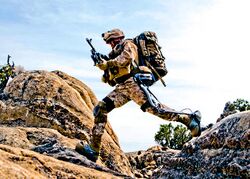

While they are still some ways off from producing a fully functional power suit, there is interest in the idea. Some people are now looking into making functional powered exoskeletons, this includes some guys in Japan and the US government. While it's initially going to be used to help do heavy lifting where heavy equipment is impractical/inadvisable, along with helping the disabled to walk once more, using it for military applications is in the works. Hell, just look at the image. The basic idea works well enough, but there are still in the experimental phases and while they got the basics of the "power" part down they have yet to add the armor.
Even so, they still have a fair bit to go since most early versions will be restricted by a power tether or run on batteries that have at most a few hours of juice. Still, the first airplane's flight only was about 35 meters and it took less then two decades to go from that to the first transatlantic flight.
When they have a working model, this will by the only Superpower ability that isn't fictional or pseudoscience.
When they do get armour, it will probably look like Fallout power armour.
Fantasy in General
Depending on who you ask, any magic armor that increases your speed and strength and has spells that counteract encumbrance bound to it could be considered a form of power armor, especially if it's full plate armor and particularly if it has some system to keep out nasty shit like drowning, poison gas, or the vacuum of space. It is armor, and it is using a power source in the form of magic to enhance the wielder. More traditional power armor can also be found in fantasy; particularly in settings that are at least to a clockpunk level of technological development, often using magic or just not caring enough about physics to allow power suits to function with technology like steam boilers, clockwork gears, and diesel engines or simply running off of magical energy. This particular trend has started to become more common as more and more fantasy writers have started to rebel against the concept of medieval stasis and even in settings that don't just outright abandon the faux-medieval trappings of fantasy try to incorporate more in the ways of technological development or practical magic. In warhammer fantasy perhaps the most famous suit of power armor belongs to Ikit Claw, an ingenious device that is powered by warp stone and comes complete with an arm cannon to fire off warp lightning.
Gallery
-
The first five Marks through the ages.
-
Diagram of Aquila armour components.
-
Eternal Crusade concept art. Again, fitting real snugly.
-
It actually fits! Still a bit unsure about those hips though.



